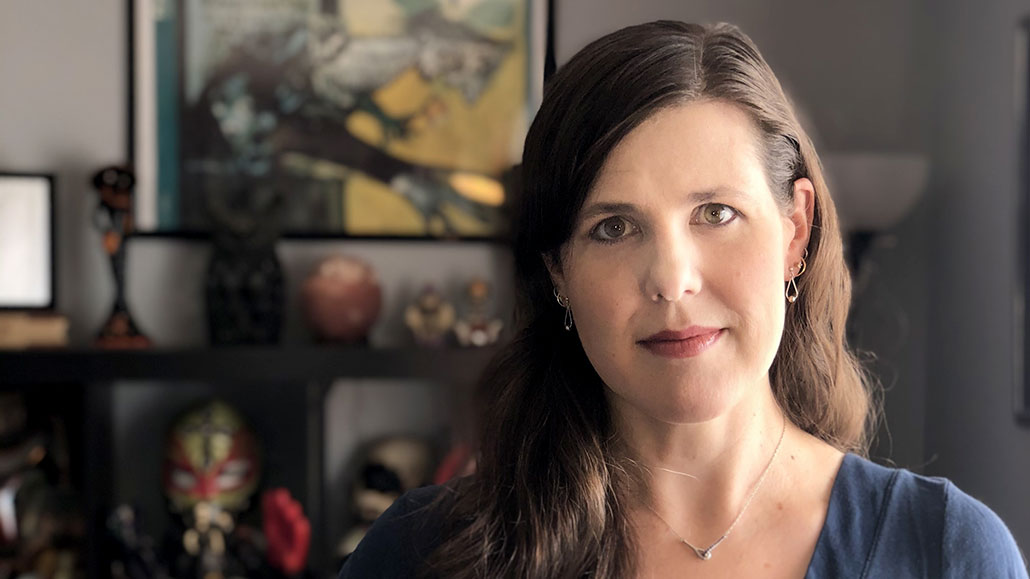This scientist knows how to frighten you
Sociologist Margee Kerr looks to empower others through haunted attractions

As a kid, Margee Kerr wondered what brought people together and what separated them. That led her to the field of sociology and, eventually, to studying our fears. Kerr’s book Scream takes readers to some of the scariest places on Earth to explore the science of fear. She now helps design haunted houses.
M. Kerr
Margee Kerr has been thinking about how zombies can help people overcome their fears.
Kerr is a sociologist. This type of scientist investigates aspects of human society. At the University of Pittsburgh in Pennsylvania, Kerr studies our fears, collecting data on how and why people seek out frightening situations. Haunted attractions use her findings to make their exhibits spookier and more fun. Kerr’s love for everything scary has led to trips all around the world in search of the perfect scare. She wrote about her experiences in her book Scream: Chilling Adventures in the Science of Fear.
People often see fear as something to be avoided, says Kerr. But fear can be used to help people lead happier and more empowered lives, she contends. Her latest project looks at how virtual reality can make treatments for intense fears, or phobias, less intimidating. In this interview, Kerr shares her experiences and advice with Science News Explores. (This interview has been edited for content and readability.)
Q: What inspired you to pursue your career?
In my work for my PhD, I looked at why some parent groups are organized around the idea that vaccines cause autism. [Vaccines do not cause autism.] I studied how and why fear was useful for inspiring large groups of people.
During that time, I had days where I was just so “in my head” from work on a computer all day. So to take a break and have some fun, I looked for haunted houses. I went to a local haunted attraction and had a light bulb moment. I had spent all my time thinking about fear as this negative thing. Yet here I was lining up to spend money and my time to be scared. That’s when my path shifted. I wanted to explore why people want to engage with things we usually see as negative and scary.
Q: How did you get to where you are today?
Growing up, my family had horses, but we didn’t have our own farm. We would board our horses at different places. I met a lot of people that way. I noticed that the people who owned the fancy barns treated the people who were cleaning their stalls so differently. I wondered why that was. That’s when I started understanding the issues of class and became interested in why people treat each other differently.
I felt like I didn’t fit in. It made me wonder what brought people together and separated people out. At first, I thought I would major in history but chose sociology instead. I wanted to learn about things happening right now. It just didn’t make sense to me why people would not like someone because of how she looks or who she loves or how she dresses. I found the tools to answer those questions in sociology.
Q: How do you get your best ideas?
I get my best ideas through reading a lot of articles and science. I love to use research to learn about how people react and their ideas about what is normal. I’ll then take that and change it into something that can be used for a really fun scare. For example, I researched how our senses process so much without our awareness. I used those findings to develop jumpscares, like things tickling your ankles or strobing lights.
A lot of haunted attractions think that they just have to continue to make their attractions scarier by adding more blood and violence. But research shows that we find new and unusual experiences more engaging, fun and scary. Thinking about the importance of where a haunt is and who lives there is important. Visitors attending an attraction in the city might find the smells of the country pretty unfamiliar. So the smell of hay or fertilizer is going to be unexpected and add a layer of excitement. A great haunted attraction doesn’t have to be all about violence.
Q: What is one of your biggest successes in your career?
Definitely the publication of my book on the science of fear. It continues to be such a meaningful accomplishment for me. It’s pretty popular among the middle-schoolers. A handful of teachers have reached out to me saying they teach this book. They find that it’s a way to introduce kids to this growing field.
I often wondered if liking scary movies made me weird or different when I was growing up. It’s fulfilling to know that the kids who read this can feel more okay about what they enjoy. That liking scary things is normal and doesn’t make a person bad. I enjoy helping people understand why they might like some things and not others. I want people to find that investigating their fears can [be] helpful rather than an obstacle in their lives.
Q: What do you like to do in your spare time?
I am really into kayaking. I live near the Chesapeake Bay and the Bush River. It’s always more fun when the waters are a little choppy. I also do a lot of hiking and outdoor activities. I’m trying to push myself. I understand now why it’s important to keep pushing our boundaries as we age. We tend to do fewer things because we’re afraid of dying or hurting our own aging bodies. That can limit our lives, and I don’t want that to happen. So I try and do things that are a little scary as I age. Of course, I’m all about decorating, dressing up and going out to local haunted attractions when it’s Halloween season.

Educators and Parents, Sign Up for The Cheat Sheet
Weekly updates to help you use Science News Explores in the learning environment
Thank you for signing up!
There was a problem signing you up.
Q: What piece of advice do you wish you had been given when you were younger?
If you want to really do what you want in life, you have to work really hard. You’re probably not going to get everything that you want. I don’t say that in a negative way. I say it more as a message that all the hard work will still be worth it.
I had a very traditional career path before I started researching fear. I was working at the Veterans Affairs Healthcare System on research projects. At first, I liked the work. But I started to realize that staying in that position would mean doing the same thing every day. It was not an environment where I was going to thrive.
I asked myself if it would be worth it to be miserable all the time just for job security and the pay. Sometimes in life, it isn’t a question of whether it is worth it but if it is necessary. It’s about having what you need to support yourself and your family. I was privileged enough to say it was not worth my mental health. I am fine living on a very limited income if it means that I can do something where I feel fulfilled every day.







